|
|
|
Sort Order |
|
|
|
Items / Page
|
|
|
|
|
|
|
| Srl | Item |
| 1 |
ID:
124860
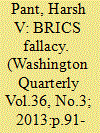

|
|
|
|
|
| Publication |
2013.
|
| Summary/Abstract |
Even as the BRICS member states come to terms with a rising China and even if they get their economic act together, the group will not be able to turn into a unified political force: a fundamental contradiction lies at the very heart of BRICS as a political idea.
|
|
|
|
|
|
|
|
|
|
|
|
|
|
|
|
| 2 |
ID:
124847
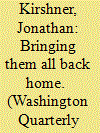

|
|
|
|
|
| Publication |
2013.
|
| Summary/Abstract |
A generally underappreciated shift in U.S. engagement with the global macroeconomic order, accelerated by the global financial crisis, has complicated managing the dollar as a global currency and placed new, politically unfamiliar constraints on U.S. power.
|
|
|
|
|
|
|
|
|
|
|
|
|
|
|
|
| 3 |
ID:
124864
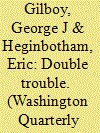

|
|
|
|
|
| Publication |
2013.
|
| Summary/Abstract |
An objective assessment reveals that India, simply because it is a democracy, will be no less likely than China as a rising power to pose significant challenges to U.S. interests. While Washington has basically gotten its China policy right, a new approach to India is needed.
|
|
|
|
|
|
|
|
|
|
|
|
|
|
|
|
| 4 |
ID:
124841
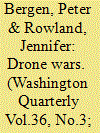

|
|
|
|
|
| Publication |
2013.
|
| Summary/Abstract |
At the National Defense University (NDU) on May 23, 2013, President Barack Obama gave a major speech about terrorismarguing that the time has come to redefine the kind of conflict that the United States has been engaged in since the 9/11 attacks. Obama asserted that ''[w]e must define the nature and scope of this struggle, or else it will define us.''1 Thus, the President focused part of his speech on the Authorization for the Use of Military Force (AUMF), which Congress had passed days after 9/11 and which gave President George W. Bush the authority to go to war in Afghanistan against al-Qaeda and its Taliban allies. Few in Congress who voted for this authorization understood that they were voting for what has become the United States' longest war, one that has expanded in recent years to countries such as Pakistan and Yemen
|
|
|
|
|
|
|
|
|
|
|
|
|
|
|
|
| 5 |
ID:
124868


|
|
|
|
|
| Publication |
2013.
|
| Summary/Abstract |
Five prevailing myths about India's nuclear posture should be dispelled, exposing its posture as no longer as minimalist as the conventional wisdom asserts with significant, underappreciated implications for safety, regional security, and crisis stability.
|
|
|
|
|
|
|
|
|
|
|
|
|
|
|
|
| 6 |
ID:
124852
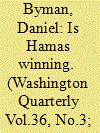

|
|
|
|
|
| Publication |
2013.
|
| Summary/Abstract |
Israel, the United States, and the international community must recognize the ugly truth: Hamas is winning, and it may be too late to reverse this trend. The current drift in policy should be replaced by coercing and incentivizing Hamas to renounce violence.
Hamas members are ''ants,'' declared Yasser Arafat, the father and long-/time leader of the Palestinian national movement, during a private speech in 1990. Its cadre, he went on, should cower in their holes lest they be crushed by Arafat's Fatah forces.1 Arafat's swagger seemed justified. Fatah had ruled the roost for decades, and after Hamas emerged in December 1987 as the first intifada erupted, the Islamist organization was on the ropes. After a few unimpressive attacks, Israel had quickly arrested over 1,000 Hamas members, including its top leadership.2 In 1989, less than three percent of Palestinians in Gaza, where Hamas would later prove strongest, supported the organization.3 Journalist Zaki Chehab claimed Hamas' military wing only had twenty machine guns as the intifada wound down.4 Fatah, it seemed, would remain the dominant
force in the Palestinian National Movement.
|
|
|
|
|
|
|
|
|
|
|
|
|
|
|
|
| 7 |
ID:
124849
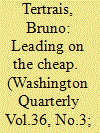

|
|
|
|
|
| Publication |
2013.
|
| Summary/Abstract |
Who would have predicted just two years ago that cash-strapped, inwardly-focused, soul-searching France would embark on a flurry of military operations and bold strategic moves? How France can really afford to remain a global power while imposing some of the heaviest budget cuts ever.
|
|
|
|
|
|
|
|
|
|
|
|
|
|
|
|
| 8 |
ID:
124871
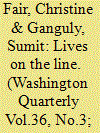

|
|
|
|
|
| Publication |
2013.
|
| Summary/Abstract |
The January 2013 clash in Kashmir emphasizes the need for a radical new approach: the United States should take the lead in changing the formal status of the Line of Control from a temporary boundary to a legally recognized international border.
|
|
|
|
|
|
|
|
|
|
|
|
|
|
|
|
| 9 |
ID:
124870


|
|
|
|
|
| Publication |
2013.
|
| Summary/Abstract |
Tactical nuclear weapons have become increasingly central to Pakistan's nuclear thinking in the past three years, significantly raising the risks of nuclear warfighting and accidents in periods of crisis, without producing military benefits.
|
|
|
|
|
|
|
|
|
|
|
|
|
|
|
|
| 10 |
ID:
124856
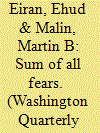

|
|
|
|
|
| Publication |
2013.
|
| Summary/Abstract |
Understanding Israel's framing of, and response to, the Iranian nuclear challenge should begin with an understanding of the four distinct forms of fear, and their contradictions, that help explain internal Israeli divisions over the response to Iran.
|
|
|
|
|
|
|
|
|
|
|
|
|
|
|
|
| 11 |
ID:
124863


|
|
|
|
|
| Publication |
2013.
|
| Summary/Abstract |
The future of the UK as a nuclear-weapon state could rest in the hands of Scottish voters in their September 2014 referendum on independence. Would an independent Scotland carry out its threat to evict the Trident force currently based there, and would London have any options?
|
|
|
|
|
|
|
|
|
|
|
|
|
|
|
|
|
|
|
|
|